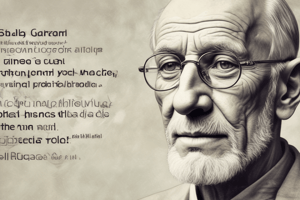Podcast
Questions and Answers
What was Carl Rogers' original career aspiration?
What was Carl Rogers' original career aspiration?
- Sociologist
- Philosopher
- Scientific farmer (correct)
- Psychologist
What was the primary focus of Carl Rogers' therapeutic approach?
What was the primary focus of Carl Rogers' therapeutic approach?
- Understanding the causes of disturbances
- Fostering growth within the client (correct)
- Developing a methodology for therapy
- Identifying and labeling disorders
What was the evolution of Carl Rogers' therapy?
What was the evolution of Carl Rogers' therapy?
- From behavioral to humanistic
- From client-therapist relationship-focused to methodology-focused
- From methodology-focused to client-therapist relationship-focused (correct)
- From humanistic to behavioral
What was a key tenet of Carl Rogers' theory of counseling?
What was a key tenet of Carl Rogers' theory of counseling?
What position did Carl Rogers hold in the American Psychological Association?
What position did Carl Rogers hold in the American Psychological Association?
What was Carl Rogers' stance on research in psychology?
What was Carl Rogers' stance on research in psychology?
What is the primary difference between humans and other living beings in terms of the actualizing tendency?
What is the primary difference between humans and other living beings in terms of the actualizing tendency?
According to Rogers, what is necessary for a person to become fully functioning or self-actualizing?
According to Rogers, what is necessary for a person to become fully functioning or self-actualizing?
What is the ideal self, according to Rogers?
What is the ideal self, according to Rogers?
What is the primary function of the actualizing tendency, according to Rogers?
What is the primary function of the actualizing tendency, according to Rogers?
What is the relationship between the self-concept and change, according to Rogers?
What is the relationship between the self-concept and change, according to Rogers?
What is the difference between awareness and ignored or denied experiences, according to Rogers?
What is the difference between awareness and ignored or denied experiences, according to Rogers?
Flashcards are hidden until you start studying
Study Notes
Carl Rogers' Life and Theories
- Wanted to be a scientific farmer, but changed to pursue a career in Psychology
- Developed a humanistic theory of personality based on his experiences as a practicing psychotherapist
- Founded Client-Centered therapy, focusing on the client-therapist relationship
- Minimized the importance of labeling disorders, instead emphasizing growth and self-actualization
Basic Assumptions of Rogers' Theory
- Formative Tendency: all matter, organic and inorganic, evolves from simpler to more complex forms
- Actualizing Tendency: humans and other living beings strive for completion, fulfillment, and self-actualization
- Involves the need for maintenance (similar to Maslow's hierarchy of needs) and enhancement (developing and growing beyond current self-concept)
Self and Actualization
- People have the creative power to solve problems, alter their self-concepts, and become increasingly self-directed
- Plants and animals have an actualizing tendency, but only humans have a concept of self and potential for self-actualization
- Three conditions necessary for becoming a fully functioning person: congruence, unconditional positive regard, and empathy
Subsystems of the Self
- Self-Concept: includes all aspects of one's being and experiences perceived in awareness (not always accurate)
- Ideal Self: one's view of self as one wishes to be, containing aspired positive attributes
Incongruence and Unhealthy Personality
- Incongruence: discrepancy between the self-concept and ideal self
- Levels of Awareness:
- Ignored: experiences not attended to (e.g., walking down a busy street)
- Denied: experiences hidden from conscious awareness (e.g., mother's anger and resentment towards her children)
Studying That Suits You
Use AI to generate personalized quizzes and flashcards to suit your learning preferences.




